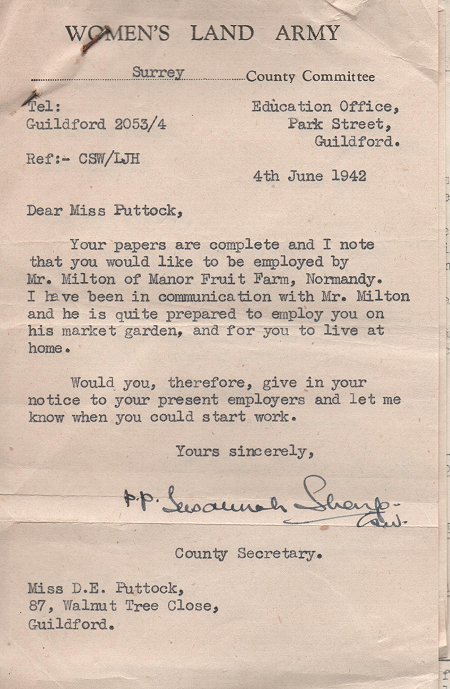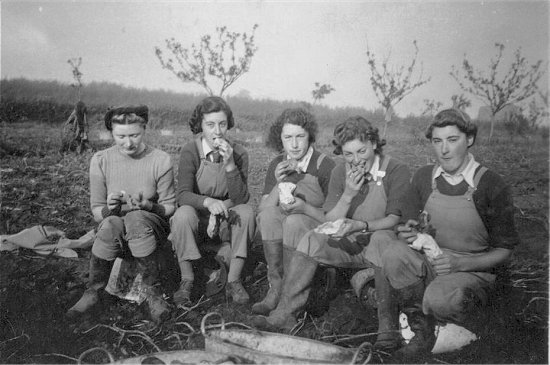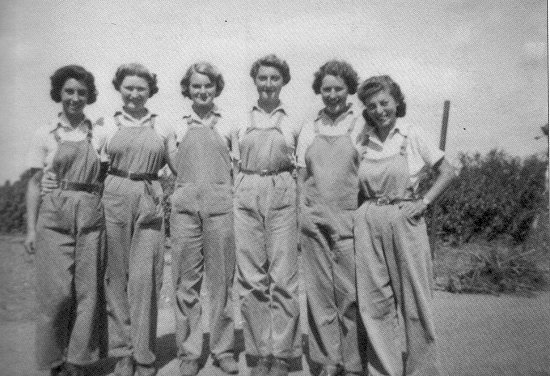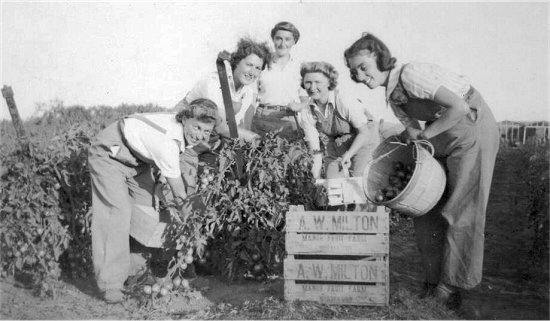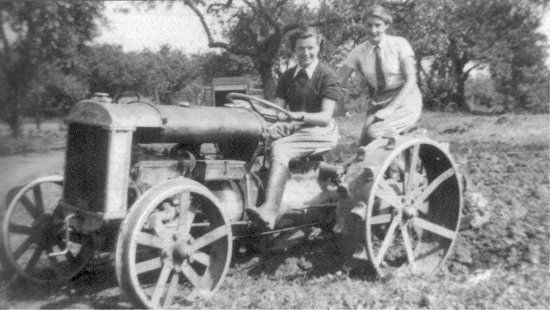Sandra Grainger and John Squier visited Doreen and her daughter Sue Jones in Hazlemere on 11th Aug 2017.
Before becoming a land girl she worked at a solicitor's and then the Co-operative coal office in Guildford. As the War progressed she became worried that she would be called up and pre-empted this by volunteering to join the Land Army. She wrote to Mr Milton of the 44-acre Manor Fruit Farm asking for a job there so that she wouldn't be sent away somewhere. He invited her for an interview and she got the job in June 1942. Today Manor Fruit Farm is the site of the new Normandy Village Hall, Doctor's surgery, Archery Club and Bowls Club and is a valuable 'green area' for Normandy residents.
It was a life-changing experience for Doreen, she had never done any land work before, it was the first time she'd ever held a hoe or a dibber and was not used to being out in all weathers. It was a 12-hour day five days a week plus Saturday mornings. They worked until dark, or in the summer until 7:30 or 8pm. When she started they were still growing flowers at Manor Fruit Farm. They were told what to grow [presumably by a government ministry] and soon switched to growing only food. The farm effectively became a market garden. There were six land girls there including Doreen, as well as Richard (Dick) Halton, the farm foreman, two tractor drivers and some elderly farm labourers. The girls were not on piece work, they received a wage of 43 shillings and 9 pence for a 48-hour week and one shilling an hour overtime pay. At busy times in the summer gypsies (Travellers) were brought to the farm and they were paid 'piece work' rates. Doreen related that these Travellers would bring their whole families including babies in prams and the prams always weighed more on the return journey! Doreen was able to commute to Normandy every day on the 7am train to Wanborough station. She often shared a carriage with Canadian and British soldiers on their way to Aldershot. One other girl lived in Guildford but the other four, who came from Croydon and Shalford, were billeted at Mr and Mrs Milton's bungalow and Mrs Horne's house in Glaziers Lane. All the girls used to go back to the Miltons' for lunch. This was not always very appetising as Mrs Milton would get stale buns from Carpenters' bakery and serve them with custard for pudding! The Miltons lived in a big bungalow which was built round an old WW1 hut. Later the girls moved out of Milton's and into the Hammonds' cottage.
The girls liked working at the end of the farm near the Guildford Road, because they could nip into the Carpenters' bakery (now Normandy Motorcycles) for fresh buns. Mrs Chant who lived nearby took pity on them and made them cups of tea, or brought out lemonade when it was hot. It was backbreaking work in all weathers, that was the worst part. Everything was manual, they had no machines apart from the Ransome tractors which the men drove (except when Marjorie 'unofficially' drove the tractor from one field to another). Mostly it was hand-planting but occasionally they borrowed a planting machine. They did the planting out in winter and spring, another hands and knees job, all in a line with their dibbers planting rows of carrots, peas, runner beans, broad beans, celery and turnips in the field. They had a go at potatoes and cultivated the wild blackberries. There were apple and pear trees between the rows of vegetables. Everything they grew was for human consumption, not animal feed. Normandy's soil is not conducive to continual use so fertiliser had to be used. The 'smelly petrol lorries' would arrive and empty human manure for the celery. They used animal manure for the rest - pig manure smelt the worst. There was a row of greenhouses by the entrance to the farm. They all had names, one was called Long Lane where the seedlings were grown. Some more greenhouses were built during the war for tomatoes and cucumbers. The greenhouses were heated so they could grow salad plants all year round. Looking after the boiler houses was the men's work. There were cloches down the side of the greenhouses, mostly for lettuce. The greenhouses had fertiliser dug in - the men did that, the women planted, everyone did the picking.
The girls were issued with dungarees, shoes, boots and oilskins but the oilskins used to leak at the seams so Doreen would go home with wet clothes and green dye on her back. The old men who had come out of retirement to work on the farm knew to put sacks over their shoulders and backs to keep dry. In June it was really hot working in the sun all day. One job Doreen didn't like was trimming the bottom shoots of the tomato plants. Mr Milton didn't like the girls wearing gloves but they had to for the tomato-picking and trimming or they'd go home with black hands which wouldn't wash clean. They used to rub some sort of ointment on their feet to harden the skin - the opposite of what people want to do now! Mr Hose came from the Manor House and did voluntary work sometimes. Mr Beer was the handyman on the farm. The workers got extra rations because there were no facilities on the farm. Mr Milton was a hard taskmaster but good to his staff. He would sometimes stand and watch the workers to make sure they were doing it right. Iris often lagged behind the other girls because she would keep them amused by relating tales about the latest films she'd seen, so the others would cover for her until Mr Milton had gone. It was a worrying time but the comradeship was unforgettable. The only time it was boring was when the weather was so bad the girls couldn't chat.
All the girls were more or less the same age, but Ruth was their leader. They called her Aunty Ruth. Mrs Fawn was the local 'supervisor' of the Land Army girls and came to check that they were alright. If they had any grievances they could tell her and if they needed replacement uniforms or anything Mrs Fawn would see to it.
It was not all work and no relaxation. During the war there were dances a couple of times a week in the old village hall. A band came from Guildford and played there. Lots of Canadians came, a few other servicemen and local people. By this time Doreen was going out with Dick Halton the farm foreman and they used to enjoy these social events. Doreen and Dick Halton married in spring 1944. Up till then she had lived at home in Guildford and Dick lived with his parents near where the Anchor pub stood. The Miltons allocated them one of the semi-detached cottages by the entrance to the farm. After the war they lived in Nutlea, a new house built by the entrance to the farm. To supplement their income and food supply Dick kept a pig on Miss Hubbard's land next to Mariners. They heard a big explosion about 4am one night and fearing for his pig Dick went to investigate and found that one of the first 'doodlebugs' had landed on Miss Hubbard's land. By the time he got there lots of 'men from the Ministry' had blocked it off to investigate and at first Dick couldn't get in to feed his unharmed pig. Dick used to take lorry-loads of food to London. He went late at night or early morning to avoid the raids. Of the other girls, Kathleen married the farm's tractor driver and lived in the adjacent cottage to Doreen and Dick. Marjorie married Dick Halton's brother Charles and became Doreen's sister-in-law. Iris moved away and worked for a film company. Ruth and Rene moved away. Others replaced them - Micky (another Marjorie) came and fitted in well. A doctor's wife from Guildford came and volunteered part-time. All the girls left gradually and Doreen applied for release from the Land Army in April 1944 shortly after the others had gone. After Mr Milton died in late 1947 his two sons took over the farm. They took out all the fruit trees and of course the topsoil became impoverished and eroded.
|

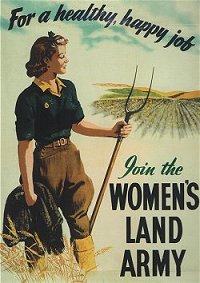 Doreen was
96 years old. She was born Doreen Puttock in Walnut Tree Close, Guildford
in 1921. Her father worked for Dennis Bros, first in their cycle shop then
when they had started making motor vehicles.
Doreen was
96 years old. She was born Doreen Puttock in Walnut Tree Close, Guildford
in 1921. Her father worked for Dennis Bros, first in their cycle shop then
when they had started making motor vehicles.